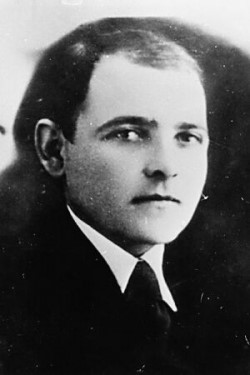
Zelik Elimelakh
Zelik Elimelakh was born in the village of Nosovichi, near Gomel (Belorussia) in 1911. He graduated from a school for metal-workers in Gomel and then worked at a factory in Kerch, Crimea. From there he was sent to the Sverdlov Communist University in Moscow that prepared Communist activists. He graduated in 1934 and was assigned to be a political worker among naval personnel. Elimelakh served on various ships. At the beginning of the Soviet-German war in June 1941, Elimelakh was the political commissar (pompolit –, i.e., a deputy commander for political matters) on the icebreaker the Sibiriakov.
Built at the Glasgow wharves in 1909 and bought by Russia in 1915, in the 1920s and 1930s the Sibiriakov was a legendary polar exploration ship. At the beginning of the war, although the Sibiriakov was provided with additional guns, it continued to serve primarily as a transport vessel.
On August 25, 1942 while on route from the port of Dikson on the Kara Sea to the Severnaia Zemlia archipelago, the Sibiriakov encountered the German cruiser the Admiral Scheer, which was hunting Allies' sea convoys heading to the Soviet Union. The German ship hoisted the U.S. flag for camouflage and asked the Sibiriakov about the whereabouts of Allied ships. Having received a radiogram noting that there were no foreign ships in the Kara Sea at this time, the Sibiriakov did not answer, and its captain declared an alert. An artillery skirmish followed, during which the Sibiriakov was hit and caught fire. When most of the sailors were killed or injured and the captain seriously wounded, the commissar Elimelakh assumed command. His first order was to fill two lifeboats with wounded men, along with a few unwounded men who might get them to Belukha Island. Than he ordered the Kingston valves of the ship to be opened so that seawater would enter and sink the ship. The last radiogram received from the Sibiriakov said: "The pompolit ordered us to abandon ship. We are burning. Farewell, 14 hours 5 minutes."
Only two members of the crew – the senior mechanic Nikolai Bochurko and the commissar Elimelakh – refused to abandon ship. The Germans immediately sank one lifeboat with a shell and captured the men in the second one. Only one sailor resisted his being captured and he was killed. Another sailor succeeded in swimming to a nearby island. According to this sailor, Elimelakh stood by the flag, saluting until the ship disappeared under the water. Bochurko was standing beside him.
Soon thereafter, some small islands situated between the place where the ship went down and the Belukha Island were named after Elimelakh, Bochurko, and several other seamen who served on the Sibiriakov.
After the war, although the heroic deeds of the sailors on the Sibiriakov in August 1942 were hailed by Soviet historians, the name of its Jewish commissar was virtually erased from history. To the question of a journalist why one of the islands was called Elimelakh, Party authorities of Dikson port replied that, "apparently the island is named after a Norwegian explorer of the Arctic." Neither Zelik Elimelakh, nor his four brothers who left their home in Gomel and went to fight with the Red Army have been memorialized in Belarus. Only two of the five survived the war.






